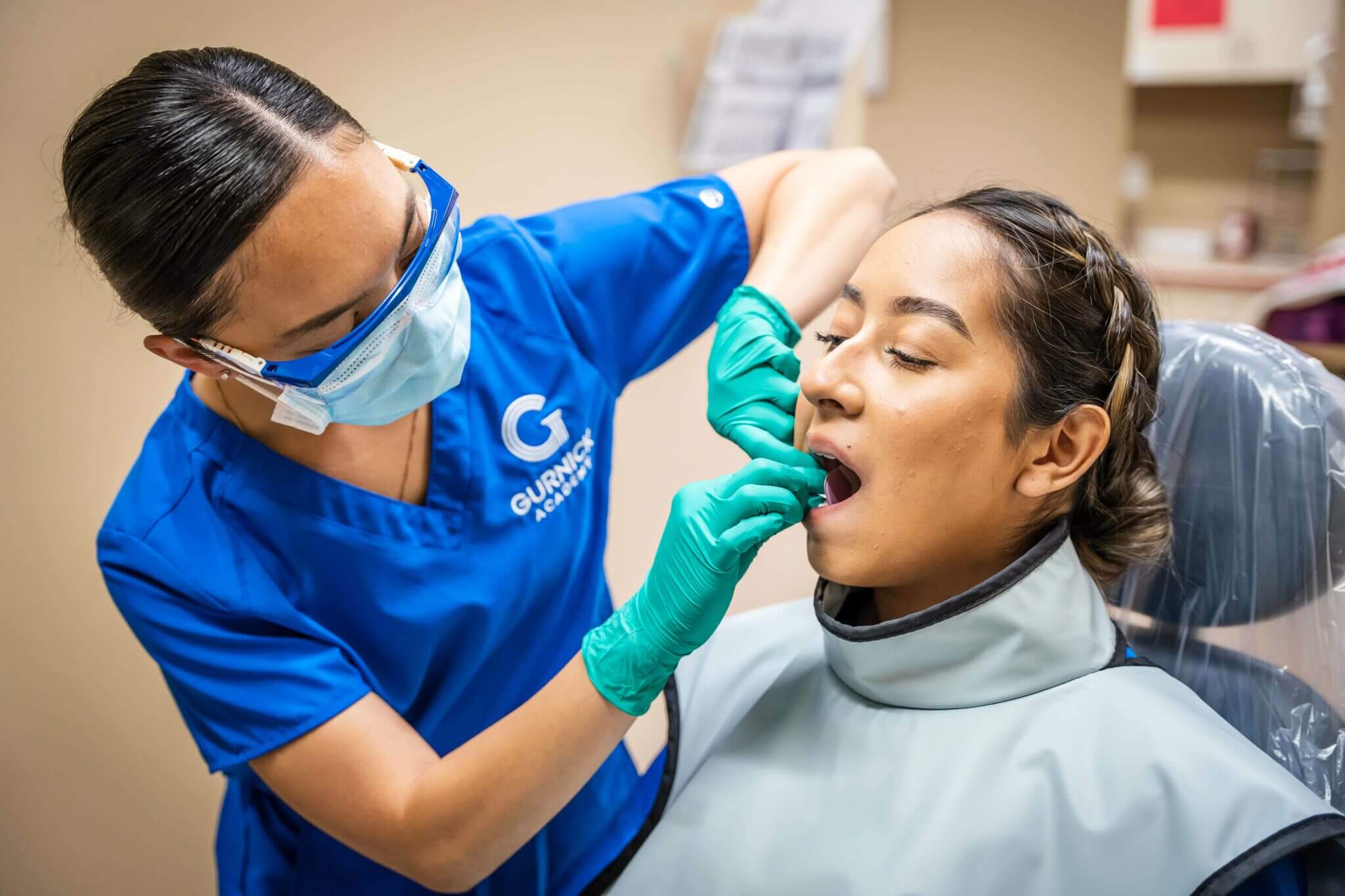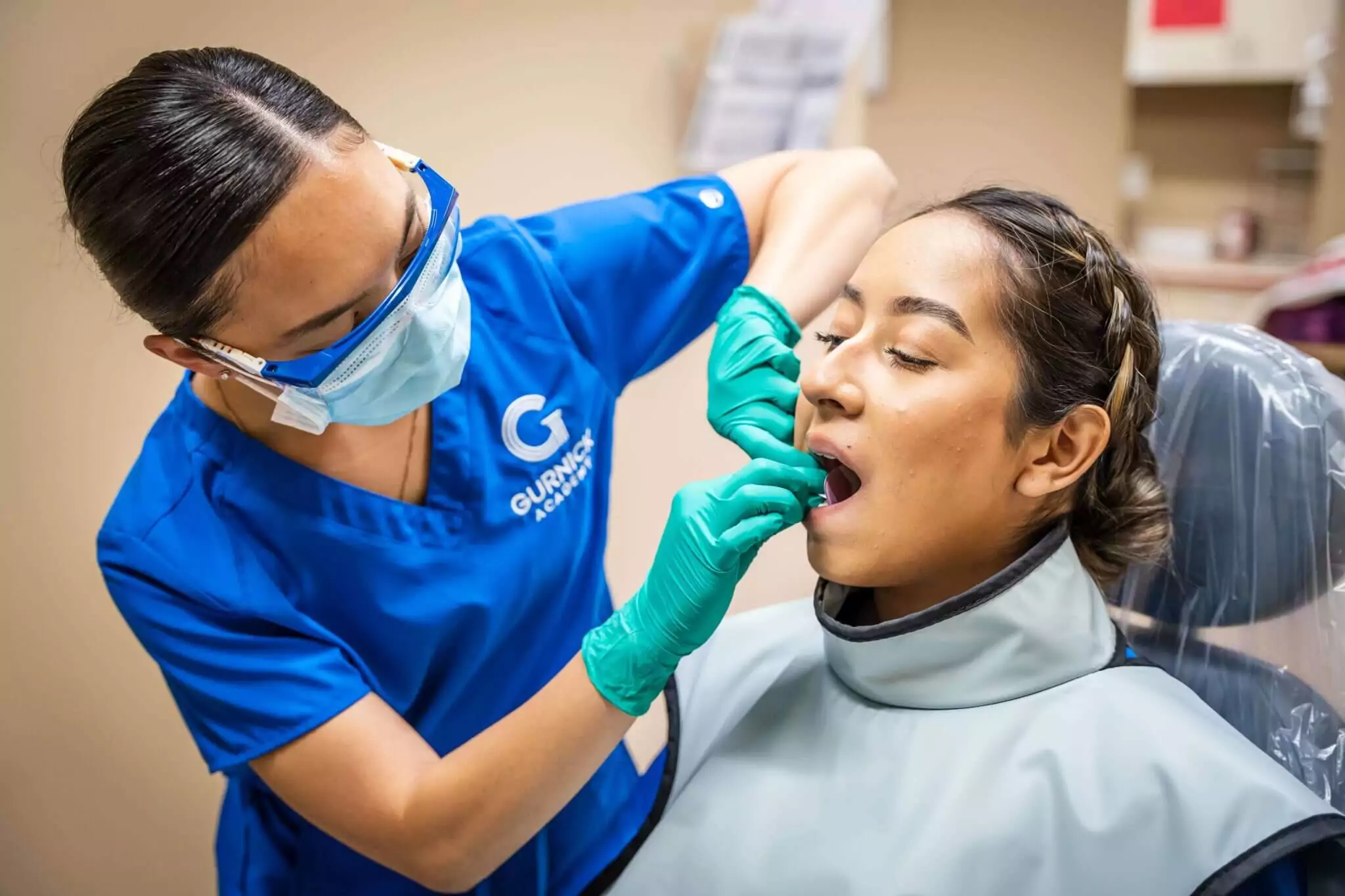Table of contents
Get Started with Kwikly
Get the latest updates, insights, and exclusive content delivered straight to your inbox.
Who This Is For
- People considering dental assisting as a first step into the dental field and curious about challenges vs. rewards.
- Students deciding whether to enroll in dental assisting school and wondering what the workload feels like.
- Current dental assistants looking for insights on managing the physical and emotional demands of the job.
- Anyone exploring career paths in dentistry and weighing dental assisting as an entry point.
Key Takeaways
- You’ll get a mix of clinical and admin work as a dental assistant, so no two days are exactly the same.
- Be prepared for the time commitment required to balance both clinical and administrative duties, especially if you’re considering part-time roles or flexible schedules.
- Sure, it can be tough physically and emotionally, but if you’ve got good communication skills and know how to handle stress, you’ll do just fine.
- The job market’s growing strong, and there’s room to keep learning and moving up, so you can feel good about what you’re doing while building your career.
Is being a dental assistant hard? If you’re thinking about this field, you’ll want to know what you’re getting into and whether dental assisting hard is a reality for most people. Chances are you’ve heard it’s got its challenges, but there are plenty of rewards too. You’ll be dealing with hands-on tasks, working with patients, and handling technical stuff every day. This article breaks it all down for you, so you can figure out if this career fits what you’re looking for.
Understanding What You'll Do as a Dental Assistant
When you’re a dental assistant, you’ll have tons of different responsibilities in the dentist's office, which keeps things interesting. Your tasks change from day to day, so you won’t get bored. You’ll assist and be the dentist’s right hand, responsible for assisting dentists and licensed dentists during each procedure, helping with:
- Jumping in on complex surgical procedures
- Teaching patients how to take care of their teeth
- Cleaning teeth
- Assisting during surgeries
- Chairside assistance to support the dentist during procedures
- Taking x rays as part of patient care
- Talking to patients about proper hygiene
In most offices, you’ll also handle administrative duties, like:
- Greeting patients when they walk in
- Getting their medical info down
- Keeping track of supplies
- Setting up appointments
- Scheduling appointments to ensure efficient workflow
- Dealing with insurance paperwork
Plus, you’ll be setting up treatment rooms and making sure everything’s clean and ready to go. It’s this mix of hands-on work and office tasks that makes dental assisting pretty exciting and varied in a dentist's office.

The Work Environment and Culture of Dental Assisting
Dental assisting puts you right where the action is—in a fast-paced, hands-on environment that keeps you moving all day. Most dental offices run tight schedules, so you need to stay organized and manage your time well to keep things flowing smoothly. The typical dental office is clean and well-organized, with a big focus on infection control. That means you're working in a safe space, and so are your patients. You'll work closely with dentists, dental hygienists, and other healthcare professionals. Everyone's working together to give patients the best care possible.
Teamwork is everything in dental assisting. You'll rely on strong communication skills to coordinate with dentists, hygienists, and other team members. Whether you're helping with procedures, prepping treatment rooms, or making patients feel comfortable, you need to communicate clearly and work well under pressure. Many dental assistants love this collaborative setup. It's motivating and enjoyable because you get to make a real difference in people's oral health and overall well-being.
The physical demands are real—you'll be on your feet for long periods, bending and reaching during procedures, handling dental instruments and equipment all day long. The hands-on nature means you're always active, helping with different dental procedures and supporting patient care. It can be challenging, but proper training, good posture, and the right equipment help minimize physical strain and keep you comfortable.
Continuing education is a big part of making it as a dental assistant. The dental field is always changing, with new technologies and procedures popping up regularly. If you commit to ongoing training and professional development, you'll be better prepared to provide high-quality patient care and stay ahead in your career.
Job security is another major benefit you get with dental assisting. Most dental offices depend on skilled dental assistants to handle both clinical and administrative tasks, and the demand for qualified professionals keeps growing. That means you can count on stability and plenty of opportunities for career advancement. Whether you want to specialize in a certain area or move up within the dental field, the opportunities are there.
Beyond technical skills, you need to be personable and empathetic. You're providing excellent customer service and making sure patients feel comfortable and informed. Dental assisting school helps prepare you for these challenges, offering hands-on training and real-world experience so you can build the confidence and skills needed for a successful, rewarding career.
The work environment and culture of dental assisting are unique and full of opportunities. You'll be part of a dynamic team, make a positive impact on patients' lives, and enjoy a career with strong job security and room for growth. With the right training, attitude, and commitment to learning, you can thrive in this challenging and fulfilling profession.
The Tough Parts of Being a Dental Assistant
Let’s be real - every job’s got its challenges, and dental assisting’s no different. You’ll need to handle:
- Being on your feet for long stretches, working in uncomfortable positions, and doing the same motions over and over, which can wear you down.
- Dealing with patients, especially when they’re nervous or stressed out about being there.
- Managing all kinds of dental tools and juggling multiple tasks, which means you need to know your stuff and pay attention to details.
But here’s the thing - lots of dental assistants figure out ways to make it work. Getting a mentor, keeping up with training, and staying organized can really help you tackle these challenges.
Let’s dig into some of the specific tough spots you might face.
Dealing with Physical Strain and Staying Comfortable
You'll be standing for hours, which gets tiring and uncomfortable. You'll find yourself in awkward positions, bending over patients or reaching for instruments. The key to handling this is wearing shoes that support your feet and staying active outside of work. Even just stretching for ten minutes before you start can help cut down on the discomfort.
Good posture and regular exercise will keep your muscles strong and prevent problems down the road. Since this job is so hands-on, you've got to take care of yourself to avoid long-term issues and stress. Taking breaks when you can and setting up your workspace to be more comfortable makes a huge difference too.
Working with Patients
You'll need to be good at talking to people to help calm their fears and explain what's happening. Dealing with patient interactions means you need solid communication skills, empathy, and ways to help people relax. You'll often work with anxious patients, so you'll need to have calming conversations or suggest ways they can chill out.
Teaching patients about oral hygiene and what to do after procedures is a big part of taking care of them. Your main interactions include:
- Saying hello when they arrive
- Getting their information
- Walking them to the exam room
- Teaching them about oral hygiene
If you practice being empathetic and know how to manage your own emotions, you'll be better at calming down stressed patients and helping them feel comfortable with their doctor.
Handling Tools and Procedures
Working with dental instruments and managing different tasks can get complex. As a dental assistant, you might face some injury risks like minor physical injuries, muscle strain from repetitive motions, and mild radiation exposure from x-rays. You might experience pain or discomfort in your neck, head, or back. You can reduce these risks by stretching before tasks, wearing protective gear, and following safety rules.
Here's what works best for dental assisting:
- Practice consistently and use lab time to get really good at the technical skills.
- Pay attention to details and use instruments properly to keep patients safe during procedures.
- Wear protective clothing and equipment to avoid contact with bodily fluids.

Is Dental Assisting School Tough?
Becoming a dental assistant is a step-by-step journey that typically begins with enrolling in dental assisting school. Most programs last about 9 to 12 months and combine classroom learning with hands-on clinical experience. These programs often require a professional certificate or associate’s degree and are designed to prepare you for entry-level opportunities in the field. During your training, you’ll gain practical experience by working with real patients, which helps you develop the skills and confidence needed to succeed as a dental assistant. This way, you can start working in about a year. How hard you’ll find dental assisting school depends on things like how dedicated you are, your study habits, and how much you want to learn.
While dental assisting has its challenges, you can handle them if you know what you’re doing. If you’re good at paying attention to details, you might find the training easier since that’s what the work’s all about. Many students say the training’s intense because they’re preparing you for real-world challenges you’ll face.
If you’re thinking about this, you should consider what dental assistant education might cost and look into financial aid options to help cover these expenses.
What You'll Learn and How You'll Train
You'll study key areas like infection control, dental anatomy, and administrative skills. These programs give you the skills and knowledge you need to succeed. They offer both hands-on training and comprehensive education, and they take less time than other medical careers. You can speed things up by taking more classes per semester if you want.
The way dental assisting programs are set up lets you build your skills gradually. To succeed in dental assisting, you need formal education, practical experience, and a commitment to keep learning. Many states have specific education and certification requirements that you'll need to meet to do certain duties.
Juggling School and Your Personal Life
Good time management is crucial for balancing dental assisting school with everything else you've got going on. Many dental assistants find flexible scheduling options through platforms like Kwikly, so they can choose shifts that work with their schedule, fitting both school and personal stuff. Using platforms that offer flexibility is essential for matching your work schedule with class times and study sessions, especially considering how much time you'll need to commit.
Setting boundaries and prioritizing what's important can help you keep up with your personal commitments while handling an intensive school schedule. If you stay organized and proactive, you can successfully handle both dental assisting school and your personal life.
The Good Stuff About a Dental Assistant Career
A career as a dental assistant gives you key benefits like job satisfaction and chances to move up. You’ll often find fulfillment in your role because of the real impact you have on patients’ oral health. Dental offices usually provide a quiet work environment with high hygiene standards and a slower pace compared to other medical offices.
Dental assisting is not just a job—it’s a meaningful career that offers stability, respect, and opportunities for growth and personal fulfillment. One of the unique advantages of this profession is the ability to relocate or work in different locations, as the skills and certifications you gain are highly transferable across various regions and even countries.
You can advance your career by specializing in areas like orthodontics or oral surgery within dentistry. If you are interested in this field, consider exploring training programs or shadowing a dental professional to learn more about the opportunities available. This rewarding career path allows for both personal and professional growth, making it a compelling choice for many people.
Job Security and Growth
The job market for dental assistants is expected to grow at 11%, which shows strong demand in the field. This rising demand makes it a promising career choice with lots of growth opportunities. You can find dental assistant jobs in various locations, since dental offices are spread out across urban and rural areas.
Taking continuing education courses can boost your job prospects and increase how much you can earn. Getting involved with professional associations like the American Dental Assistants Association can give you valuable resources and networking opportunities.
Personal and Professional Satisfaction
Working as a dental assistant gives you a strong sense of personal fulfillment through patient interaction and support. You play a vital role in helping patients, reducing their anxiety and making sure they have a positive experience during dental visits. By contributing to oral health, you help promote better overall health outcomes for your community.
Career advancement opportunities include becoming dental hygienists or using your experience for dental school applications. This rewarding profession offers both personal satisfaction and professional growth, making it a fulfilling career path.
How Kwikly Supports Dental Assistants
Kwikly supports dental assistants by giving you a user-friendly platform where you can pick shifts that work with your personal schedule. Through Kwikly's flexible scheduling feature, you can easily select shifts that fit your lifestyle, helping you balance work and life better.
The Kwikly Wallet lets you get same-day pay, so you have immediate access to your earnings and more financial flexibility, helping you make more money in your new job.
Overall, Kwikly simplifies the process of finding shifts and getting paid, offering valuable support to dental assistants in their careers. Let's look at how these new features can benefit you.
Flexible Scheduling with Kwikly
Kwikly lets you select work shifts that fit your personal schedule, giving you substantial control. You can balance work with other commitments like family or education by choosing from a variety of shifts. This flexibility helps you manage a fast-paced lifestyle with a tight schedule.
Being able to select shifts based on your availability lets you maintain a better work-life balance. This feature is particularly helpful if you're juggling multiple responsibilities, making it easier to stay organized and focused.
Same-Day Pay with Kwikly Wallet
Kwikly Wallet gives you the opportunity to earn same-day pay. With Kwikly, you can get paid on the same day you work, thanks to the Kwikly Wallet functionality. This feature enhances your financial flexibility, letting you manage your finances more effectively.
The convenience of earning same-day pay through Kwikly Wallet is a significant advantage if you're seeking immediate access to your earnings. This financial flexibility can be a game-changer for many people, providing peace of mind and financial stability.

Preparing for a Successful Career in Dental Assisting
Preparing for a career in dental assisting involves strategic planning and a proactive approach to education and skill development. Developing a comprehensive career plan that includes education, certification, and networking is essential if you want to be a dental assistant. Continuing education is crucial to keep up with industry standards and improve your skills.
Networking with other professionals in the dental field can provide valuable mentorship and opportunities for personal and professional growth. By staying organized and proactive, you can position yourself for long-term success in the healthcare industry.
Continuing Education and Certification
You'll need to frequently update your technical knowledge because dental technologies advance rapidly. Success in dental assisting requires a commitment to ongoing education and skills development. Ongoing education helps you stay current with advancements in dental practices and technologies.
Getting certification from recognized bodies like DANB can enhance your career prospects and confidence. Pursuing additional certifications in specialized areas can significantly boost your career prospects. This commitment to education and certification ensures a rewarding career with plenty of opportunities for growth.
Networking and Professional Development
Building a professional network is crucial for you to find mentorship and learn about job opportunities. Establishing a professional network can open doors to job opportunities and mentorship in the dental field. Getting involved with professional organizations and attending industry events can provide you with valuable networking opportunities and resources, such as:
- Finding mentorship
- Learning about job opportunities
- Accessing valuable networking opportunities
- Using resources from professional organizations and industry events
Using online platforms like LinkedIn lets you connect with industry professionals and discover job opportunities. Building support systems with classmates and instructors can enhance your success in dental assisting school.
Networking and professional development are key parts of a successful career in dental assisting, enhancing your skill set in the field.
Summary
Dental assisting is a challenging yet rewarding career that offers diverse responsibilities, job security, and personal fulfillment. While the demands of the job can be significant, with proper training, effective communication skills, and a commitment to ongoing education, you can thrive in this dynamic field.
Kwikly provides valuable support to dental assistants through flexible scheduling and same-day pay, making it easier to balance work and personal life. By preparing strategically and taking advantage of opportunities for professional growth, you can look forward to a successful and fulfilling career. Jump into this profession with confidence, knowing that the rewards are well worth the effort.
Frequently Asked Questions
Is dental assisting school hard?
Dental assisting school can be demanding, but with your dedication and passion for learning, you can definitely succeed. Embrace the journey, and you'll be well on your way to a rewarding career in no time!
What are the main responsibilities of a dental assistant?
As a dental assistant, you'll play a vital role in patient care by cleaning teeth, assisting in surgeries, managing appointments, and educating patients about oral hygiene. Embrace this opportunity to make a positive impact on people's dental health!
How does Kwikly support dental assistants?
Kwikly empowers dental assistants with flexible scheduling and same-day pay, enabling you to choose shifts that suit your life and get paid immediately after your work. It's a fantastic way to take control of your career while enjoying financial freedom!
What are the physical demands of being a dental assistant?
Being a dental assistant is physically demanding, requiring you to stand for extended periods and perform repetitive tasks. To tackle this challenge, invest in supportive footwear, stay active, and maintain good posture for a more comfortable work experience.
What career advancement opportunities are available for dental assistants?
You can elevate your career by becoming a dental hygienist, specializing in areas like orthodontics or oral surgery, or pursuing dental school. Seize these opportunities to enhance your skills and open new doors!








